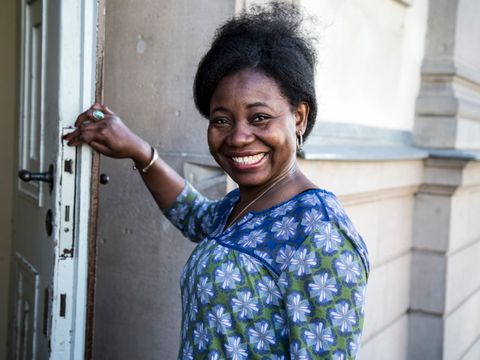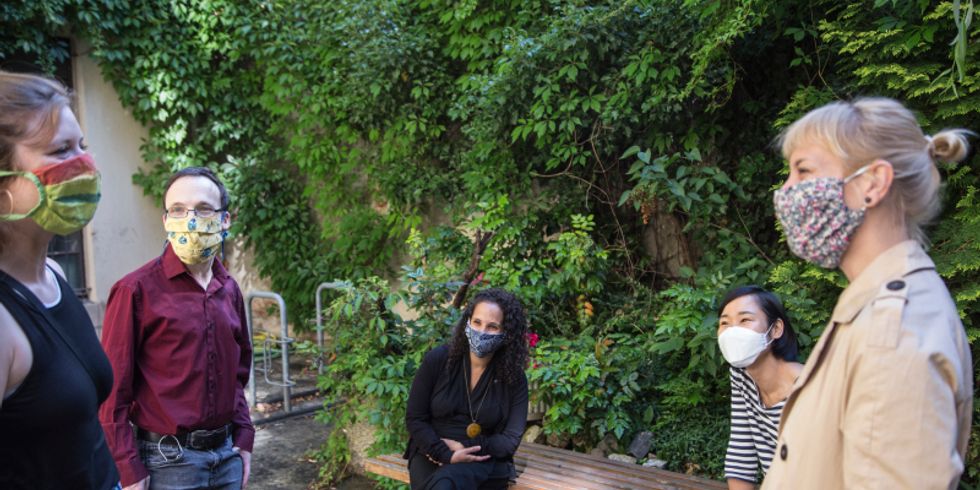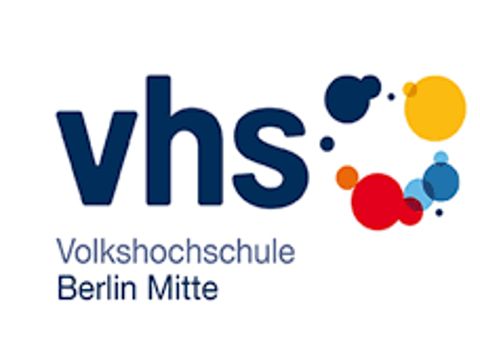VHS: How did you feel about this photo day in June?
Helen Haukamp: At that time, everything in Berlin was closed. It was the first time I wore masks with other people in a building like that. It was unusual, but surprisingly not unpleasant. It was cool to walk through the VHS with such different people. And also to see the different rooms for a change. The photo group of about 9 people did play out real classroom situations that day. I love to learn. We learned the Hebrew alphabet, play in the jewelry, ceramics and dance rooms. Dancing with you was fun and I would have liked to show you more tricks with the hoop (that’s what we did in that cozy back garden). I remember we all had wet feet because the janitor had watered the lawn earlier. I was already in that teaching frenzy you get into as a teacher when we were stopped again!
VHS: Ha! Yes. The photographer kept stopping us, whenever he had enough pictures of each situation and I kept directing you around the house.
Helen Haukamp: Exactly! There is also this photo, where I am the first in the queue and the Greeter Doreen shows me the program booklet at the reception. We browsed through it together and especially looked at the many language courses. I would have liked to sign up directly for every other course.
Nari Park: I remember how I found that the emotions behind the masks were so hard to see. I learned over time to look closer to see a smile. My daughter was there that day, walking all over the place. And I talked to Todd about our kids.
Todd Stuchiner: Yeah, we talked about what it’s like to have kids growing up bilingual or trilingual. And about the phases when you have doubts about whether you can do it with learning German. We both have trouble learning the vocabulary and I got encouragement from Nari. I remember that I also felt sad that day, because I realized just how much life had changed because of Corona. It seemed so impersonal, having to sit two meters away from someone else on the bench.
Zohar Zehavi: On the day of the photo, it was like discovering myself. The workshops, the movement rooms – it’s incredible how many things are offered. I came home and said to my husband, “You don’t understand. They really offer EVERYTHING!” Especially as a migrant in a big city, it is important to have a place to start.
Jana Koch: For me the experience was new, that you can still connect with others (with a mask). It’s nice that you can experience this with new people and express curiosity about each other through body language, eyes, posture or smiles. Communication finds a way.
It’s unbelievable how many levels of the Volkshochschule came together. It is so interesting to see who is actually involved in making the VHS as versatile and lively as it is. Where the threads come together and are held. Who puts their ideas in there and pushes which buttons? From the person who opens up in the morning to the person who plans and runs programs. It’s not just what you see, after all. There are so many different people working on the overall VHS product. On that day, it was nice to see that people have the same interest: to create a space together that is alive, where people meet and exchange ideas. That’s the only way education can work: To be interested in each other, to have curiosity and openness for people and for a topic as common ground.
This free space is what I like about the VHS. The space for experimentation. When I was a teenager, I learned Czech at a VHS because my father is Czech. There was a clear goal and a clear course. Probably most people come to a course with a clear goal. This goal-oriented approach is very nice. But it’s also good that there are open processes where you need to accept that it might fail. You have to put up with developments that you didn’t plan. That’s the only way new things can emerge and everything can stay alive. Sometimes you forget that. It’s nice that the VHS has that, too.



